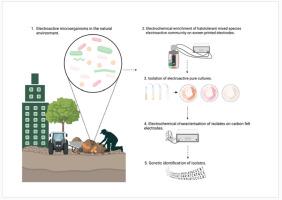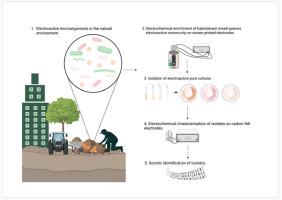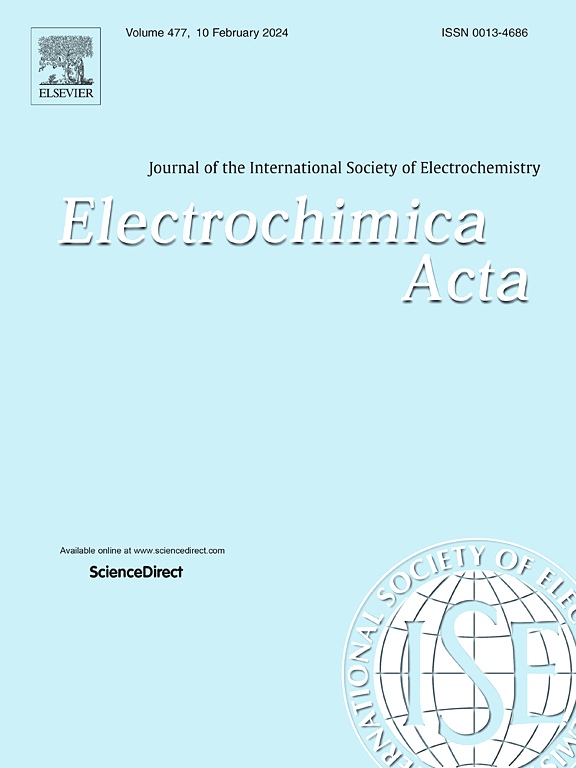弱电原群落的电化学富集和三种耐盐电活性分离物的特征:Micrococcus sp.
IF 5.5
3区 材料科学
Q1 ELECTROCHEMISTRY
引用次数: 0
摘要
高盐条件下的微生物电活性虽然具有基础性和应用性,但鲜有研究。这项研究报告了在施加阳极电位的丝网印刷碳电极上进行的盐碱条件(2% NaCl)下电活性微生物的富集。从弱电活性富集群落中,纯培养获得了三个耐盐电活性分离物,并通过 16S rRNA 基因测序进行了鉴定。两个分离物为革兰氏阳性(拟命名为 Micrococcus sp.这些分离物在传统碳毡电极上使用计时器测定法进行电化学鉴定。经过两天的生长,观察到微球菌 YH-1 的电流密度为 8.29 ± 0.85 μA/cm2,与报告的电活性模式微生物 Shewanella oneidensis 的数值相当。由于输出电流较低(分别为 2.19 ± 0.46 μA/cm2 和 1.73 ± 0.47 μA/cm2),Gordonia sp.值得注意的是,有关微球菌属(Micrococcus)和戈尔多尼亚属(Gordonia)电活性的报道非常有限。循环伏安法显示,微球菌 YH-1 和 Stutzerimonas sp.扫描电子显微镜显示,每种分离物都在电极上定植,Micrococcus sp.这项研究扩大了耐盐电活性微生物的范围,同时也加深了我们对弱电原、革兰氏阳性菌的胞外电子传递以及自然环境固有电活性的了解。本文章由计算机程序翻译,如有差异,请以英文原文为准。


Electrochemical enrichment of a community of weak electricigens and characterisation of three halotolerant electroactive isolates: Micrococcus sp. YH-1, Gordonia sp. RH-1 and Stutzerimonas sp. CH-1
Microbial electroactivity in elevated salt conditions is seldom studied, despite both fundamental and applied relevance. This work reports the enrichment of electroactive microorganisms under saline conditions (2 % NaCl), performed on screen-printed carbon electrodes with applied anodic potential. From the weakly electroactive enriched community, three halotolerant electroactive isolates were obtained in pure culture and identified via 16S rRNA gene sequencing. Two isolates were Gram positive (proposed names Micrococcus sp. YH-1 and Gordonia sp. RH-1) and one was Gram negative (proposed name Stutzerimonas sp. CH-1). The isolates were electrochemically characterised on conventional carbon felt electrodes using chronoamperometry. After two days of growth, a current density of 8.29 ± 0.85 μA/cm2 was observed in Micrococcus sp. YH-1, comparable to reported values for the model electroactive microorganism Shewanella oneidensis. Gordonia sp. RH-1 and Stutzerimonas sp. CH-1 appeared to be weak electricigens due to their low current output (2.19 ± 0.46 μA/cm2 and 1.73 ± 0.47 μA/cm2, respectively). The isolates are notable as there are very limited reports of electroactivity in the genera Micrococcus and Gordonia. Cyclic voltammetry revealed prominent redox peaks in Micrococcus sp. YH-1 and Stutzerimonas sp. CH-1. Scanning electron microscopy demonstrated colonisation of the electrode by each isolate, along with thin cellular appendages in Micrococcus sp. YH-1 and Stutzerimonas sp. CH-1. This work extends the catalogue of characterised halotolerant electroactive microbes while also enhancing our understanding of weak electricigens, extracellular electron transfer in Gram positives, and the inherent electroactivity of the natural environment.
求助全文
通过发布文献求助,成功后即可免费获取论文全文。
去求助
来源期刊

Electrochimica Acta
工程技术-电化学
CiteScore
11.30
自引率
6.10%
发文量
1634
审稿时长
41 days
期刊介绍:
Electrochimica Acta is an international journal. It is intended for the publication of both original work and reviews in the field of electrochemistry. Electrochemistry should be interpreted to mean any of the research fields covered by the Divisions of the International Society of Electrochemistry listed below, as well as emerging scientific domains covered by ISE New Topics Committee.
 求助内容:
求助内容: 应助结果提醒方式:
应助结果提醒方式:


